In an idle moment of wondering, I asked a simple question on Twitter:
What’s everyone’s favourite fictional mathematician?
— Katie Steckles (@stecks) November 10, 2014
The response was overwhelming. Here’s a guide to the non-existent number crunchers you should know about, and some you probably already do.
Ian Malcolm
Suggested by @mathgrrl, @mikenajera73, @donsheldon, @kesmathematics and @cnorthwood
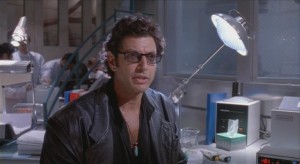 The most popular response by far, and actually the person I was thinking of when I asked the question, is Ian Malcolm from the Jurassic Park series of novels/films. He’s played by Jeff Goldblum in the film versions, and is an expert in chaos theory. The author, Michael Crichton, was apparently inspired by real-life mathematicians Ivar Ekeland and James Gleick, and the character spends a lot of time pointing out that (SPOILER ALERT) if you create something as unpredictable and uncontrollable as a park full of dinosaurs, the results will tend towards the chaotic – maybe you don’t need to be a chaotician to work that out, but it’s great to see a mathematician in film that’s actually cool and doesn’t conform to the usual stereotypes.
The most popular response by far, and actually the person I was thinking of when I asked the question, is Ian Malcolm from the Jurassic Park series of novels/films. He’s played by Jeff Goldblum in the film versions, and is an expert in chaos theory. The author, Michael Crichton, was apparently inspired by real-life mathematicians Ivar Ekeland and James Gleick, and the character spends a lot of time pointing out that (SPOILER ALERT) if you create something as unpredictable and uncontrollable as a park full of dinosaurs, the results will tend towards the chaotic – maybe you don’t need to be a chaotician to work that out, but it’s great to see a mathematician in film that’s actually cool and doesn’t conform to the usual stereotypes.
The character is also responsible for the novel having an iteration of a fractal printed at the start of each chapter (see below) – it’s the Harter-Heighway Dragon Curve, sometimes called the Jurassic Park fractal, and it increases in complexity as the events in the story get more and more uncontrolled. 
James Moriarty
Suggested by @mtbachelor, @yoyoichiban and @serabe
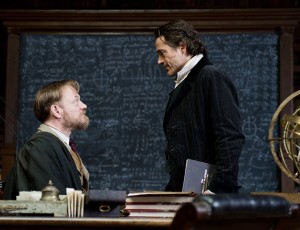 Our second most popular choice was the arch-nemesis of everyone’s favourite abductive logician, Sherlock Holmes. Professor James Moriarty has been portrayed numerous times in TV and film since the original novels by Sir Arthur Conan Doyle, and it’s not always emphasised that his original training was as a mathematician – although in ‘The Final Problem’, Holmes describes Moriarty as having “a phenomenal mathematical faculty”, and says “he won the mathematical chair at one of our smaller universities”. Even though Moriarty is entirely fictional, and Conan Doyle never elaborated on its contents, Moriarty’s book ‘A Treatise on the binomial theorem’ has its own Wikipedia page. Moriarty’s mathematical work is discussed in a 1989 piece at New Scientist (subscription required), and for the 2011 film Sherlock Holmes: A Game Of Shadows, a team from Oxford University were engaged to write some convincing mathematics for the production, including a code based on Fibonacci numbers – further detailed in a PDF at SIAM.
Our second most popular choice was the arch-nemesis of everyone’s favourite abductive logician, Sherlock Holmes. Professor James Moriarty has been portrayed numerous times in TV and film since the original novels by Sir Arthur Conan Doyle, and it’s not always emphasised that his original training was as a mathematician – although in ‘The Final Problem’, Holmes describes Moriarty as having “a phenomenal mathematical faculty”, and says “he won the mathematical chair at one of our smaller universities”. Even though Moriarty is entirely fictional, and Conan Doyle never elaborated on its contents, Moriarty’s book ‘A Treatise on the binomial theorem’ has its own Wikipedia page. Moriarty’s mathematical work is discussed in a 1989 piece at New Scientist (subscription required), and for the 2011 film Sherlock Holmes: A Game Of Shadows, a team from Oxford University were engaged to write some convincing mathematics for the production, including a code based on Fibonacci numbers – further detailed in a PDF at SIAM.
Hari Seldon
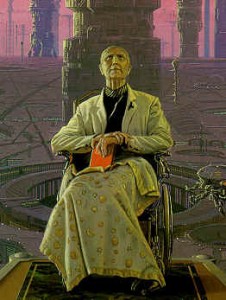 Suggested by @sparksmaths and @eardil
Suggested by @sparksmaths and @eardil
If you’ve read Isaac Asimov’s Foundation series of books, you’ll recognise the name Hari Seldon – he’s a mathematician who predicted the future using a combination of history, sociology and statistical probability. He and his work are featured throughout the series, which comprises a total of seven novels set in the same universe. The original trilogy was accompanied by two sequels and two prequels; in them Seldon predicts the downfall of the Galactic Empire, and takes steps to ensure the future of humanity and its collective knowledge.
Fans of the series will also be excited to hear about the upcoming TV adaptation…
Uncle Petros
Suggested by @alexlittledice
From the 1992 novel Uncle Petros and Goldbach’s conjecture, reviewed at the MAA website by Keith Devlin, in which a young boy gets to know his reclusive uncle, who’s trying to prove that every even number can be written as the sum of two prime numbers. Apparently, when the book was published in the UK/US in 2000, the publishers announced a $1m prize for anyone who could prove the conjecture within two years – which nobody did.
Max Cohen
 Suggested by @bendixon1 and @rockhyrax
Suggested by @bendixon1 and @rockhyrax
Protagonist of the Darren Aronofsky film Pi, in which Max, a paranoid mathematician, works out some frankly unbelievable maths which allows him to predict the stock market, and is chased by shady mafia types, Wall Street financiers and Hasidic Jews, until he removes the knowledge from his own brain using a [spoilers].
Charlie Eppes
Suggested by @Skhxs and @mr_dexter_scott
 Charlie Eppes is the lead character in TV mathematical police procedural drama (police algorithmical?) Numb3rs; he is a mathematician, and also the brother of an FBI agent, and together they fight crime. It’s exactly as bad as it sounds.
Charlie Eppes is the lead character in TV mathematical police procedural drama (police algorithmical?) Numb3rs; he is a mathematician, and also the brother of an FBI agent, and together they fight crime. It’s exactly as bad as it sounds.
Leopold Bloom
Suggested by @rebelafons
The main protagonist of James Joyce’s Ulysses, Leopold Bloom is rarely described in synopses as being a mathematician – although it is mentioned in Chapter 17 that he spent some of 1886 ‘preoccupied with the problem of the quadrature of the circle‘.
Any member of the Spacing Guild
Suggested by @sted304A
In the Dune series of novels, the Spacing Guild are responsible for making the necessary calculations to allow faster-than-light travel by the universe’s space ships. Powered by the ubiquitous ‘spice’ which is central to the economy, and vital for interstellar trade and travel, mastering these spacecraft puts the mathematicians in a highly respected position. Basically, everyone’s nice to the mathematicians because without them everything would go badly wrong. Much like in real life.
Dr. Harry Adams
Suggested by @donsheldon
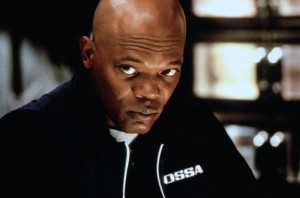 Literally nobody will remember who this is from the name, but if I say ‘Samuel L Jackson’s character in the movie Sphere’, literally two people will then know who I’m talking about. Adapted from the Michael Crichton novel, the 1998 sci-fi thriller featured another cool movie mathematician (could he fail to play a character that’s cool?) sent as part of a team to investigate a mysterious spaceship from the future that’s crashed on the bottom of the ocean.
Literally nobody will remember who this is from the name, but if I say ‘Samuel L Jackson’s character in the movie Sphere’, literally two people will then know who I’m talking about. Adapted from the Michael Crichton novel, the 1998 sci-fi thriller featured another cool movie mathematician (could he fail to play a character that’s cool?) sent as part of a team to investigate a mysterious spaceship from the future that’s crashed on the bottom of the ocean.
Adams quickly determines (using mathematician logic) that since the ship has travelled back in time, and the ship’s log records the incident which sent them back as an ‘Unknown Event’, it must be the case that nobody makes it back from their expedition alive – since otherwise they’d have told someone what happened, and the Event would no longer be Unknown. Luckily, [spoilers].
Catherine Llewellyn
Suggested by @chrisamaphone
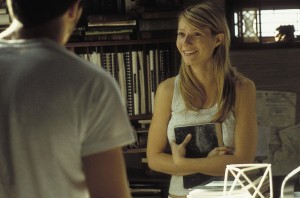 From the 2005 film Proof, in which Gwyneth Paltrow plays a mathematician (and also Jake Gyllenhall plays a mathematician, and Sir Anthony Hopkins plays a mathematician). Catherine (Paltrow)’s ageing father struggles to continue doing maths due to his degenerating mental state. She claims that among the many books of mathematical nonsense he’s generating, the one which contains a real, exciting and groundbreaking proof (of an unspecified mathematical conjecture, heavily implied to be the Riemann Hypothesis) was actually hers, and hilarity ensues. The film also implies that all mathematicians do loads of drugs all the time. Just like in real life.
From the 2005 film Proof, in which Gwyneth Paltrow plays a mathematician (and also Jake Gyllenhall plays a mathematician, and Sir Anthony Hopkins plays a mathematician). Catherine (Paltrow)’s ageing father struggles to continue doing maths due to his degenerating mental state. She claims that among the many books of mathematical nonsense he’s generating, the one which contains a real, exciting and groundbreaking proof (of an unspecified mathematical conjecture, heavily implied to be the Riemann Hypothesis) was actually hers, and hilarity ensues. The film also implies that all mathematicians do loads of drugs all the time. Just like in real life.
The Professor from ‘The Housekeeper and the Professor’
Suggested by @tombutton
This Japanese novel from 2003 features a number theorist, referred to only as ‘The Professor‘, who has suffered memory problems due to a car accident, and can only remember 80 minutes’ worth of time. He takes on a housekeeper, whose inquisitive son Root (so called because his head is flat, like a square root symbol) is invited to come to the house in the evenings, and together they learn about the beauty of equations.
T homasina Coverly
homasina Coverly
Suggested by @jamesbsumner
A mathematical genius from Tom Stoppard’s 1993 play Arcadia, the 13-year old Thomasina works out chaos theory and the second law of thermodynamics by herself, and makes reference to such concepts as entropy, iterated equations and the deterministic universe. The play is set in two different time periods, and does not shy away from covering complex topics from maths and science, including chaos theory which is a main theme of the play.
Arthur Seldom
Suggested by @colemanspebg
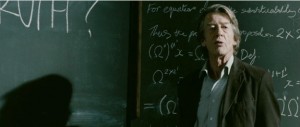 2008 British film The Oxford Murders, based on an Argentine novel, stars John Hurt as Oxford mathematics professor Arthur Seldom. A strange series of murders occurs involving his friends, and a student played by Elijah Wood finds himself drawn into the mystery as events unfold. According to Wikipedia, Seldom’s research is in Logical Series, which is an entirely made up type of maths, but during the film they mention concepts such as “Wittgenstein’s rule-following paradox, Heisenberg’s Principle of Uncertainty, Gödel’s Theorem, circles, the Vesica Piscis, […] Fermat’s Last Theorem and its proof by Professor Wiles, the Taniyama conjecture, the tetraktys and the Pythagoreans” – although Fermat’s Last Theorem is called Bormat’s last theorem, and Wiles is called Wilkes. Nice.
2008 British film The Oxford Murders, based on an Argentine novel, stars John Hurt as Oxford mathematics professor Arthur Seldom. A strange series of murders occurs involving his friends, and a student played by Elijah Wood finds himself drawn into the mystery as events unfold. According to Wikipedia, Seldom’s research is in Logical Series, which is an entirely made up type of maths, but during the film they mention concepts such as “Wittgenstein’s rule-following paradox, Heisenberg’s Principle of Uncertainty, Gödel’s Theorem, circles, the Vesica Piscis, […] Fermat’s Last Theorem and its proof by Professor Wiles, the Taniyama conjecture, the tetraktys and the Pythagoreans” – although Fermat’s Last Theorem is called Bormat’s last theorem, and Wiles is called Wilkes. Nice.
Lawrence Pritchard Waterhouse
Suggested by @brucegrembowski
From Neal Stephenson’s Cryptonomicon, a 1999 novel which, like Tom Stoppard’s Arcadia, is set in two different time periods – this time, WWII-era Bletchley Park, and the late 1990s fictional Sultanate of Kinakuta. In both settings, mathematicians work on code-breaking: one set striving to crack the Enigma and win the war, and the other working on modern-day cryptalgorithms for internet banking and data storage. The book doesn’t shy away from technical descriptions of the work, including prime numbers and modular arithmetic. Waterhouse is a US Navy codebreaker and mathematical genius, and his grandson Randy is present in the modern-day world.
David Sumner
Suggested by @mjdominus
 From the 1971 psychological thriller Straw Dogs, which was banned on its first release due to extremely violent and brutal scenes throughout the film. Mathematician David Sumner, played by Dustin Hoffman, holidays in Cornwall with his wife, where characters from her past (horrendous understatement warning) cause trouble and events lead to Sumner behaving in a very unmathematical way. Not for kids. Or anyone probably.
From the 1971 psychological thriller Straw Dogs, which was banned on its first release due to extremely violent and brutal scenes throughout the film. Mathematician David Sumner, played by Dustin Hoffman, holidays in Cornwall with his wife, where characters from her past (horrendous understatement warning) cause trouble and events lead to Sumner behaving in a very unmathematical way. Not for kids. Or anyone probably.
Honourable Mentions
Chen Sung Yau from A Very Peculiar Practice (suggested by @jamesbsumner) – this BBC comedy-drama series from the 1980s featured Peter Davidson as a doctor in a university medical centre. His flatmate, Chen Sung Yau, was a mathematician.
Deep Thought from The Hitchhiker’s Guide to the Galaxy (suggested by @kitkilgour) – not technically a mathematician since this giant computing machine is not human, but in the words of Kit, it “took its time, caused interest and gave an ‘accurate’ answer that was completely useless”. Sounds like a mathematician.
Felix Rayman (suggested by @madeleines) – from the 1980 sci-fi novel White Light, which explores the concept of infinity and the continuum hypothesis, and features cameos from Georg Cantor and Albert Einstein. Felix is a maths teacher who experiments with lucid dreaming and finds himself travelling to a magical place called Cimon, where they stay at Hilbert’s infinite hotel.
Trillian from Hitchhiker’s Guide to the Galaxy (suggested by @rockhyrax and @peterrowlett) – one of the group of adventurers Arthur Dent finds himself in the company of, Trillian (originally named Tricia McMillan, but she picked a spacier monicker for exploring the galaxy) is a ‘brilliant mathematician/astrophysicist’ – possibly the only one ever portrayed by Zooey Deschanel.
Fred Burkle (suggested by @peterrowlett) – from Joss Whedon’s Buffy The Vampire Slayer spin-off, Angel. (Wini)fred is a physicist and helps the team fight the forces of evil with equations. In later series, she heads up the science division of a large company, and any laughable suggestion that ‘scientist’ isn’t a specialism that one person can have is abandoned completely.
Adric (suggested by @usrbinprl) – from Doctor Who, Adric accompanied the fourth and fifth Doctors. Adric has a brilliant mathematical mind, and even wears a badge for ‘mathematical excellence’.
Jane Grey from Action Science Theatre (suggested @towelinmonk) – AST is 20-minute comedy science drama podcast, in the style of a radio play, that my friend Brian does. I’m sad to say I haven’t listened to it, but apparently it features a mathematician called Jane Grey, and maybe now I will.
Captain Picard (suggested by @peterrowlett) – Placing him one step closer to ‘greatest human of all time’, Star Trek: The Next Generation‘s Jean-Luc apparently dabbles in a bit of number theory when he’s not busy captaining a starship or being well-loved by everyone. Watch a video clip of him talking about Fermat’s Last Theorem.
Mr Spock (suggested by @sparkalisha) – of course, Picard’s not the only Starfleet crew member who’s mathematically inclined. As well as his constant quest for logic, Spock is often heard to quote the probability of extremely unlikely events (which never stopped Kirk from proceeding anyway, despite the odds). For a proper run-down of the maths in Star Trek: TOS, James Grime can sort you out.
The camel in Terry Pratchett’s Pyramids (suggested by @ianrobinson) – from the Discworld series, a wonderful fantasy/parody/social commentary series of novels by Terry Pratchett. In the seventh book, Pyramids, a camel (whose name is too rude to mention here) is described as “the greatest mathematician on the disc”, although it’s not clear if he’ll ever get the opportunity to show this, or if he did whether he’d actually be bothered to do so.
“The Guy from Numberwang” (suggested by @RDWhelan) – possibly a joke suggestion, but if you haven’t yet seen comedy duo Mitchell and Webb’s take on modern TV gameshows, you should take a look at some clips of it on YouTube, or buy their DVDs. That’s numberwang!
D-503 from the novel We (suggested by @liverbubble) – this Russian sci-fi novel is set in a futuristic world where everything’s made of glass, in which humans are numbered instead of named – including spaceship building engineer D-503 (who’s the central character). Having not read the novel, I can’t comment on his maths credentials, but I do like a good bit of dystopian sci-fi.
For children
The Mathemagician (suggested by @danhett) – from The Phantom Tollbooth, a 1961 children’s novel by Norton Juster, adapted into a film in 1970. The twin kingdoms of Dictionopolis (ruled by King Azaz) and Digitopolis (ruled by his brother, The Mathemagician) continue the age-old argument as to which is better, letters or numbers.
Mr Peabody (suggested by @hankmcljr) – originally a character in the Rocky/Bullwinkle-based children’s cartoon series, Mr Peabody is a highly intelligent beagle, who adopts a human child to keep him company and together they travel in time. Made more well-known by the 2014 movie, although Mr Peabody is more of a generalist than a mathematician specifically.
The Number Devil (suggested by @sellathechemist) – this 1997 novel by Hans Enzenberger features a young boy who is guided through his worries about mathematics by The Number Devil, who visits him in his sleep and explains mathematical concepts using simple analogies. I’m confused. Doesn’t that happen to everyone? That’s how I learned maths.
El Nombre (from Facebook): this anthropomorphic Mexican gerbil, who appeared in sketches during BBC Schools’ NumberTime, was always on hand whenever counting or numbers were needed, and would show everyone how to draw the different shapes of numbers by drawing them in the sand. The clips are still available on YouTube, in case you’re not sure.
Dexter (suggested by @sparkalisha) – not to be confused with serial killer Dexter Morgan from the HBO series Dexter (he is a different kind of scientist), Dexter from Dexter’s Laboratory is a boy-genius scientist, and since all science is maths, presumably also a maths genius. If only he could keep his annoying sister from finding her way into his lab! Hilarity ensues.
Count Von Count (suggested by @tombutton) – from Sesame Street, this mathematical muppet delights in counting loudly the number of things that there are, then laughing maniacally. Specialism: set theory. Apparently he was a guest on BBCR4’s More or Less in 2009.
Not That Kind Of Fictional
Udo of Aachen (suggested by @watfordpete) – introduced in an April fool’s hoax in 1999, Udo is a fictional monk from the 13th century, created by author Ray Girvan. Udo is credited with the discovery of the Mandelbrot Set, centuries before Benoit Mandelbrot.
Fictional incarnations of Ada Lovelace (suggested by @jamesbsumner) – her status as a singularly well-known female mathematician of the era means she crops up in a lot of period fiction, including steampunk novel The Difference Engine, which I’ve read and is good.
Nicolas Bourbaki (suggested by @sparksmaths and @jamesmoosh) – this French mathematician set out to reformulate mathematics in the 20th century, using a grounding of set theory. Only he didn’t actually exist, and was the pseudonym of a group of mathematicians including Henri Cartan, Jean Coulomb, André Weil, Jean-Pierre Serre and Alexandre Grothendieck, among many others. Bourbaki is credited with the invention of the empty set symbol ($\emptyset$), the terms ‘injective’, ‘bijective’ and ‘surjective’, and the ‘dangerous bend‘ symbol (which I bet you’d never heard of either).
Pythagoras (suggested by @kesmathematics and @casmilus) – while there may well have existed a mathematician and philosopher called Pythagoras of Samos, it’s been suggested that many of the mathematical discoveries attributed to him were in fact discovered by his followers, and so like Bourbaki he was a collection of people working under the one name. All references to Pythagoras came from the accounts of his followers, suggesting they made him up – also, he was variously suggested to be the son of the god Apollo, and to have a golden thigh. Sounds legit, right?
I’ve never liked Ian Malcolm, because he never seemed like a real mathematician to me. His “chaos theory” seemed to be just “Murphy’s Law” dressed up with some jargon. I never saw the connection to real chaos mathematics in Jurassic Park (and indeed, I don’t think there is one).
Thanks for the page!
Awesome list!
May I suggest Will Hunting, from “Good Will Hunting”, played by Matt Damon. I suggested it in Twitter but maybe too late (@fxn).
How about Nicolas Bourbaki ? He did publish, though not a physical person. Maybe rather imaginary, not fictional, but worth mentioning, in my opinion.
Which is why he was mentioned, right at the end!
My mistake …
Moriarty, Trillian and Deep Thought are probably my favourites on that list. If you’re including Nicolas Bourbaki, it only seems reasonable to similarly include the eminent graph theorist Blanche Descartes: http://en.wikipedia.org/wiki/Blanche_Descartes
Nobody mentioned Good Will Hunting?!
— @evanberkowitz